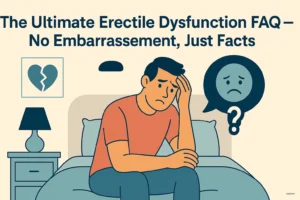
Female sexual dysfunction or sexual problems occur when an individual or couple faces an issue during any phase of the sexual response cycle. This issue prevents them from experiencing satisfaction from sexual activity.
- Causes of Female Sexual Dysfunction
- Female Sexual Dysfunction Effects on Women
- Diagnosis of Female Sexual Dysfunction
- Treatment of Female Sexual Dysfunction
- Is There a Cure for Female Sexual Dysfunction?
- Effect of Hormones on Female Sexual Dysfunction
- Effect of Hysterectomy on Female Sexual Dysfunction
- Effect of Menopause on Female Sexual Dysfunction
There are four main phases of the sexual response cycle: excitement, plateau, orgasm, and resolution.
Only 43% of women with sexual dysfunction report this issue, making it a widespread problem that often goes ignored. People may be hesitant or embarrassed to discuss this issue, but it is essential to remember that it is treatable. Sharing your concerns can make your sexual life much healthier.
Causes of Female Sexual Dysfunction
Female sexual dysfunction is attributed to two main areas: psychological and physical.
Physical causes can include different medical conditions. You may face problems due to heart disease, diabetes, hormonal imbalances, neurological diseases, menopause, chronic diseases like liver failure, and drug or alcohol abuse. Certain medications can also have side effects that affect sexual function and desire.
Psychological causes can include depression, anxiety, stress, guilt, relationship problems, concerns about sexual performance, or past sexual trauma.
Female Sexual Dysfunction Effects on Women
There are some common problems that women may face due to female sexual dysfunction. These can include:
Inhibited Sexual Desire can result in a lack of interest or desire for sex. It can be attributed to hormonal changes, medical conditions, medication, pregnancy, depression, fatigue, and stress. Dull, regular sexual routines can also lead to low enthusiasm for sex and exhausting lifestyle factors such as caring for children.
The inability to Become Aroused can be due to insufficient vaginal lubrication due to inadequate stimulation. The blood flow can also affect the clitoris and vagina in some cases.
Anorgasmia is the inability to achieve an orgasm that women often face. It can be caused by sexual inhibition, lack of knowledge, inexperience, and insufficient stimulation. Certain medication and chronic diseases can also prevent sexual climax. Psychological factors such as guilt, feelings of sin or shame, anxiety, and past sexual trauma or abuse can also negatively affect orgasms.
Painful Intercourse can be caused by poor lubrication, pelvic mass, ovarian cysts, endometriosis, vaginitis, sexually transmitted diseases, or the presence of scar tissue from surgery. Many of these diseases are not in the common knowledge of women and often go undiagnosed even after many checkups due to bias in medicine. The fear that women may have about the pain of intercourse or past sexual trauma can also cause sexual problems. This issue is relatively unknown to people and can go untreated.
Diagnosis of Female Sexual Dysfunction
Female sexual dysfunction diagnosis is a complicated process. A woman’s pain is often undermined and goes undiagnosed due to bias in medicine. Women need to ensure that their doctor takes a thorough physical examination, evaluation of symptoms, and medical history. Pelvic exams to check the health of reproductive organs and a Pap smear may also be needed.
Diagnosing psychological causes can be essential to address fear, anxiety, relationship problems, drug or alcohol use, and past sexual trauma or abuse.
Treatment of Female Sexual Dysfunction
Unlike male sexual dysfunction, there is no Viagra pill that women can take to cure female sexual dysfunction. The best approach possible is to treat the condition through the combined efforts of the patient, their doctors, and trained therapists. Treatment strategies can include the following:
- Education about sexual function, human anatomy, sexual behaviors, and appropriate responses can help women overcome their anxiety about sexual performance and function.
- Enhancing stimulation can involve erotic material, changes in sexual routines, and masturbation.
- Distraction techniques can increase relaxation and eliminate anxiety. They include exercises with intercourse, non-erotic or erotic fantasies, videos, music, or television.
- Encouraging non-coital behaviors like sensual massages can increase communication between partners and promote comfort.
- Minimizing pain and increasing comfort by using different sexual positions can help women control penetration and help relieve pain. Vaginal lubrication can also eliminate pain caused by friction. Warm baths before intercourse can also increase relaxation.
Is There a Cure for Female Sexual Dysfunction?
Treatment for female sexual dysfunction can be successful, depending on the underlying cause of the problems. If a reversible or treatable condition causes sexual dysfunction, the outlook for positive results is good. Even mild dysfunction due to anxiety, stress, or fear can be treated with improved communication between partners, education, and counseling. However, treatment for more significant underlying issues is more complex due to a lack of research and possible treatment strategies.
Effect of Hormones on Female Sexual Dysfunction
Hormones can affect sexual function and desire in women. Many women may experience changes in sexual function as they age, as a decrease in the female estrogen hormone occurs due to menopause and aging. Aging can also decrease genital sensation and vaginal lubrication. Low testosterone levels can also cause a decline in genital excitement, orgasm, and sexual arousal. Research on the effects of medication and hormones is still being conducted to treat sexual problems in women.
Effect of Hysterectomy on Female Sexual Dysfunction
Changes in sexual function can occur after a hysterectomy (removal of the uterus), which includes the loss of desire, genital sensation, and decreased vaginal lubrication. This problem may be caused by the hormonal changes after such a procedure. Blood vessels or nerves can also become damaged, affecting sexual function.
Effect of Menopause on Female Sexual Dysfunction
The loss of estrogen during menopause can lead to changes in sexual function. Emotional changes may also cause inhibited sexual desires. Vaginal lubricants or Hormone Replacement Therapy (HRT) can improve such conditions.
Some postmenopausal women may also experience increased sexual satisfaction. They may stop taking birth control pills that are affecting their sexual desires. They may even have decreased anxiety with regard to becoming pregnant. Fewer child-rearing responsibilities can allow them to enjoy intimacy and relax with their partners.
It is essential to seek help if you face female sexual dysfunction. There is also a need to conduct more research into female anatomy and female sexual issues to help women in a better way.
schedule a consultation at our office to learn more.








